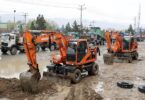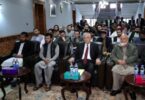KABUL (Khaama Press): Ever-Increasing poverty and political crisis in Afghanistan add up to the number of beggars across the country, as the Prime Minister of the current government orders probe into the case.
Mullah Mohammad Hassan Akhund, a Prime Minister for the Islamic Emirates, during a cabinet meeting called for the Ministry of Labor and Social Affairs (MOLSA) and International Committee of Red Cross (ICRC) office to investigate the growing numbers of beggars in Afghan capital. The probe came at a time local residents express concern over growing poverty and unemployment rate across the country, saying only few roads could bee seen without beggars these days – an unprecedented review on country’s overall economic situation.
“The cabinet of the Islamic Emirate of Afghanistan in its 31st session ordered various agencies to address the problem of poverty and unemployment, especially the increase in begging in Kabul,” said Inamullah Samangani, aspokesman for the Islamic Emirate. “They were asked to present a comprehensive plan and implement it as soon as possible,” said Inamullah Samangani,” he added.
While a majority of women among working class are the breadwinners of their household, the ongoing situation has forced desperate families to stretch hands for help on Kabul streets – a growing concern that puts the future of Afghanistan to uncertainty. “I have seven children. My mother-in-law and father-in-law are living with me. We have no breadwinner and my sister-in-law also lives with us. She is disabled,” Sadia said, as TOLOnews quoted.
“We have nothing at home. When I collect money from begging, I buy a piece of bread for my family. My sisters are starving,” said a child who is begging on a Kabul street. Meanwhile, analysts blame the sudden change and overall political crisis in Afghanistan since the takeover last August, saying the country is moving towards “absolute poverty”.
“Households’ economic situation are moving toward absolute poverty, and the level of poverty is increasing,” said Shakir Yaghoubi, an analyst, according to the local media. The ongoing political crisis since the takeover last August has “hit hard” private sectors in Afghanistan, where businesses were halted and put to uncertainty, according to a latest survey conducted by the World Bank.
Due to shortage in sells, private companies have laid off more than a half of their employees on average, a rising concern on unemployment rate in the country. “The majority of surveyed businesses reported a drastic decline in consumer demand for their products and services and have been forced to scale back operations, reduce investments, and lay off employees,” the report said.
According to the survey, small enterprises have been hit hardest with about 38 percent of them seizing operation, comparing to a 25 percent among medium and 35 percent among large businesses in the country. The finding shows Afghan domestic inputs have become more expensive and yet difficult to obtain due to supplier closure and supply chain disruptions, which all lead to price inflation since the beginning of political uncertainty. In August 15, 2021 the Taliban took control of Afghanistan, rolling back the foremost achievements of the post-2001 reconstruction efforts on overall growth of the country.






